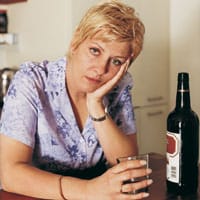The risk of having a co-morbid mental disorder is higher among those who have a substance use disorder such as an alcohol addiction. While there are various factors that lead to the development of an alcohol use disorder, there have been many studies that focus on the presence of alcohol use disorders in those who are diagnosed with depression. Recently, researchers led by Marc A. Schuckit of Rutgers University in New Jersey examined the relationship between alcohol use disorders. The research was unique in its approach, distinguishing between the role alcohol plays in both short-term, temporary major depressive episodes and those that are longer and ongoing. The distinction is critical, because some major depressive episodes occur only in the context of heavy alcohol consumption, while independent depressive episodes occur independently of heavy alcohol consumption. The researchers hypothesized that if a longitudinal study design used interviews with individuals with depression and their families would shed light on a difference between the types of depression. With a distinction made between independent depressive episodes and alcohol-induced episodes, the researchers could identify whether alcohol played more of a role in certain types of depressive episodes. The researchers believed that there would be no evidence of a connection between independent depressive episodes and alcohol use disorder. The researchers interviewed 397 individuals, gathering histories of alcohol use disorder, independent depressive episodes and substance-induced depressive episodes. The interviews were conducted over a period of 30 years. The researchers also interviewed 449 offspring, utilizing the Semi-Structured Assessment for the Genetics of Alcoholism interview. The participants in the study were all male. The overall instances of independent depressive episodes over the 30-year period occurred at a rate of 15.3 percent. Of those who developed an alcohol use disorder, 31 percent of depressive episodes were induced by alcohol consumption. Among the men who were followed throughout the 30 years, participants with independent depressive episodes did not exhibit an increased rate of alcohol use disorder. They also did not have a higher rate of use or abuse with illegal substances. The same conclusions were found to be true among the offspring of the participants, all above the age of 12 at the interviews. The findings provide essential information for understanding the relationships between alcohol consumption and types of depressive episodes. Understanding independent depressive episodes and alcohol-induced depressive episodes as separate considerations for research could significantly impact research methods and clinical evaluations. The findings could also act as a springboard for better understanding of other mental health disorders that are often found to co-occur with alcohol use disorder, such as anxiety disorders. This research could impact the screenings and treatments of those who seek out substance abuse treatment or treatment for depression.

